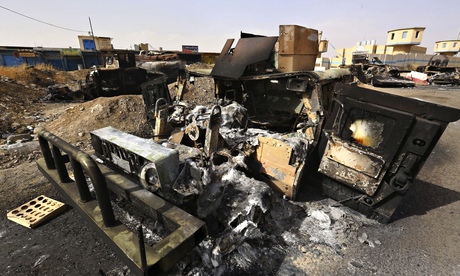Israel tells U.S. Kurdish independence is 'foregone conclusion'
Displaced families from the city of Tikrit make their way to Kirkuk June 16, 2014.
CREDIT: REUTERS/ AKO RASHEED
|
Labels: Vengeance for Zion

Displaced families from the city of Tikrit make their way to Kirkuk June 16, 2014.
CREDIT: REUTERS/ AKO RASHEED
|
Labels: Vengeance for Zion
 |
| Tensions are high in Kirkuk after control of the historic Iraqi city was taken over by the Kurds after the Iraqi army abandoned its positions. Photograph: Spencer Platt/Getty Images |
Labels: Judgment 4 - Burning, Judgment 5 - Abandonment, Judgment 6 - Civil War, Judgment 7 - Plundering
 |
| The Haditha Dam in 2006, when it was protected by American Marines. Jim Wilson/The New York Times |
Labels: Final Outcome - Complete Desolation, Judgment 8 - Flood, Judgment 9 - Drought
 |
| The Kurdish Peshmerga forces have been able to keep ISIS at bay while Iraqi forces melted away in the face of the militant group's advance (Margaret Evans/CBC) |
Labels: Final Outcome - Complete Desolation, Iraq is Babylon of Jeremiah 50-51, Judgment 6 - Civil War, Judgment 7 - Plundering
Labels: Iraq is Babylon of Jeremiah 50-51, Judgment 6 - Civil War, Judgment 7 - Plundering, Vengeance for Zion
Labels: Judgment 6 - Civil War, Kings of the Medes
Labels: Judgment 4 - Burning
Labels: Judgment 1 - Invasion, Judgment 2 - Capture, Judgment 3 - Punishment, Judgment 4 - Burning, Judgment 5 - Abandonment
Labels: Flee from Babylon
Labels: Judgment 5 - Abandonment
Labels: Judgment 6 - Civil War
Labels: Judgment 5 - Abandonment
Labels: Great nations of the north
Labels: Judgment 6 - Civil War, Kings of the Medes
Labels: Great nations of the north, Judgment 6 - Civil War, Kings of the Medes
Labels: Judgment 6 - Civil War
Labels: Judgment 6 - Civil War
Labels: Judgment 4 - Burning
 |
| Kurdish fighters outside Kirkuk on Wednesday - PHOTO: REUTERS |
Labels: Judgment 6 - Civil War
Labels: Judgment 4 - Burning
Labels: Final Outcome - Complete Desolation, Judgment 1 - Invasion, Judgment 2 - Capture, Judgment 3 - Punishment, Judgment 4 - Burning, Judgment 5 - Abandonment, Judgment 6 - Civil War
Labels: Final Outcome - Complete Desolation, Judgment 4 - Burning, Judgment 5 - Abandonment, Judgment 6 - Civil War, Judgment 7 - Plundering
 |
| Families fleeing violence in Iraq’s Nineveh Province gathered at a checkpoint west of Erbil in the autonomous region of Kurdistan. Safin Hamed/Agence France-Presse — Getty Images |
Labels: Judgment 4 - Burning
 |
| Burnt vehicles belonging to Iraqi security forces at a checkpoint in east Mosul, after insurgents seized control of the city. Photograph: Reuters |
Labels: Judgment 4 - Burning